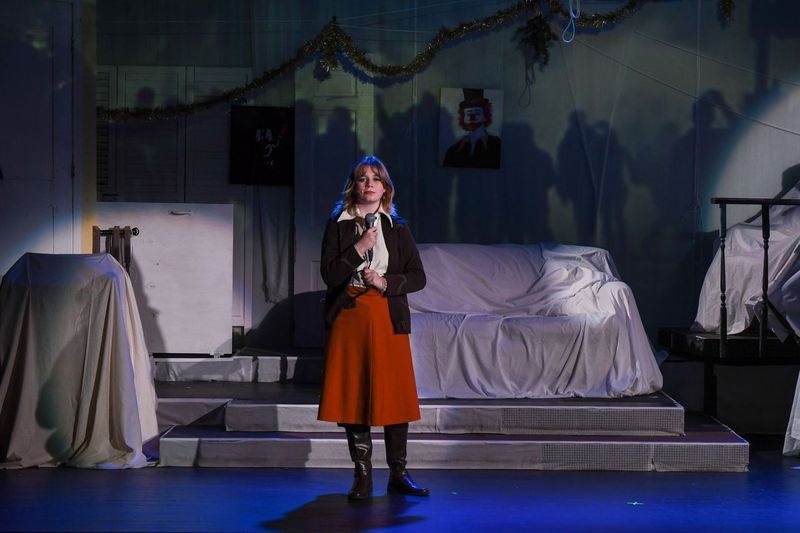Pictured above – Lorelei Jernigan performs at Tennessee Tech’s Backdoor Playhouse during the recent production of “Crawlspace.” The production was staged with the help of scale models and 3D printing.
Before the use of the 3D printing, individual scenes were often planned out by handmade sketches as well as computer models
Cookeville – It takes a variety of skills to bring a production to the stage and starting last summer, Tennessee Tech’s Backdoor Playhouse has started using an unexpected piece of technology to make all the behind-the-scenes work just a little bit easier.
Bob Cardana, head of design/production manager at the Backdoor Playhouse, has worked with artistic director Mark Creter and facilities manager/shop foreman James Alder, to create a scale model of the playhouse’s stage. They now have the capability to 3-D print miniature furniture and other set pieces for each of their shows to place inside the model to help with blocking out of scenes before the actors ever step foot on the stage.
“During our last show, ‘Crawl Space,’ where we were making up the staging of the whole show as we went along, it was nice to be able to sit down and look at the model and say, ‘I’m going to need that there, and I’m going need that person to come in there.’ It really was very helpful,” Creter said. “So, I wasn’t just having to rely on what’s in my memory of it, but I literally was able to see a miniature version of it. And it saves you from wasting the time of the actors during a rehearsal who are waiting there while you are trying to figure it all-out,” added Alder. “It gives the director the opportunity to see the set ahead of time, before you call everybody in.”
Before the use of the 3D printing, individual scenes were often planned out by handmade sketches as well as computer models. They sometimes staged miniature sets made with small blocks representing furniture. Tape and folding chairs could also be placed on the real stage floor to represent furniture configurations.
However, the new technology gives the added benefit of being able to see the set and its pieces in 3D and easily being able to manipulate the components.
“Doing the three-dimensional versions allows the director to better see what they’re dealing with,” Cardana said. “Because sometimes in a drawing, you can’t see how much space is behind an object and what it really looks like. Also, with a drawing when you need to make a change you have to erase, or you may have to even re-draw the entire thing. Now, we can resize or tweak an element and just click a button and it re-prints itself.”
3D printing is only one way the Backdoor Playhouse is utilizing technology. They are also using things like computer programs that enable them to turn drawings into 3-D scenes that they can then use to adjust ideas for lighting, backdrops, colors of furniture and more. The real stage also utilizes computerized lights and projections that are used during the shows.
“Theater is one of the oldest professions known to man and it’s our job as practitioners of theater to constantly be looking for the cutting edge, because it’s always evolving and changing and reflecting the society it’s meant to represent,” said Alder.
According to Cardana, many of the students taking theater classes have been surprised to find out that the skills they are learning have given them an edge in their careers that have had nothing to do with the stage. Engineering majors have shared feedback that they’ve learned a whole new point of view on the design stage of engineering. Nursing students have found strategies on how to speak to patients and their families. Education majors have used theater classes to learn how to keep attention in a classroom.
“I’ve gotten feedback over the years from former students who took an acting class just because they thought it would be fun,” Creter said. “And now it’s no big deal standing up and doing a business presentation in front of 300 people. I provide students with a hands-on approach, that is adaptive, customized, project based, one-on-one learning, using the tools to learn, grow, change, adapt, solve problems, identify then expand their limitations, and help them make choices to direct their lives into an unknown future,” Cardana said.
Photo courtesy of Tennessee Tech.









